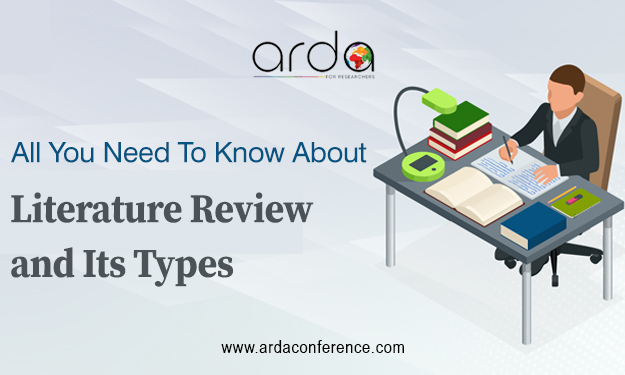All You Need To Know About Literature Review and Its Types
Literature reviews are critical analyses of scholarly articles on a particular topic. It is done to summarize and analyze an existing literary work. It can be either brief, a few paragraphs, or a long detailed report.
For the most part, an academic literature review highlights how knowledge has evolved within a particular field, what has been done so far, what is slowly emerging, and what is currently accepted.

There are different types of literature reviews depending on the individual creating it. For instance, literature reviews done by those pursuing a PhD are comprehensive. In contrast, those done by undergraduates may stick to a particular section of literature. Moreover, they have different literature review formats depending on the scope of research and analysis undertaken.
What is the Purpose of Literature Review in a Research Paper?
Academic literature reviews help assess a scholarly work, emphasizing how it contributed toward a specific topic. It also helps identify disagreements or gaps in the scholarly work that may have been under-researched or uninvestigated.
Writing a good literature review aims to understand the existing scholarly work, develop it further, or identify the topic of inquiry intricately. It may also be done to resolve controversies or unveil the need for additional research.
What are the Types of Literature Reviews?
Literature reviews depend on the discipline, researcher’s level, and evaluation purpose. It ranges from narrowly focused overviews to comprehensive examination of the existing scholarly work, each serving different functions. It can be classified into the following:
1. Traditional Literature Reviews
Also known as narrative literature reviews, it is the most common type researchers choose. It aims to critique the scholarly work and summarize its body. They may also identify inconsistencies or gaps within the body of knowledge or draw conclusions about the topic. It follows a subjective and flexible approach, unlike systematic literature reviews. Often, it may include critical analysis and interpretation along with the author’s insights and perspectives on the topic.
2. Scoping Literature Reviews
As the name suggests, a scoping literature review aims to identify the scope or coverage of an existing body of knowledge on a specific research question or topic. Authors often prefer it when the research area is not well-defined or complex. Additionally, it is preferable to write a literature review when the emerging knowledge is unclear and cannot be approached with a strict methodology of systematic literature reviews.
3. Systematic Literature Reviews
Most scholars in the upper levels have to choose this type of academic literature review as it follows a rigorous methodology. It is a well-defined approach compared to the other types of literature review. It is used to identify, evaluate, and analyze relevant studies from the literature. The primary objective is to provide an evidence-based summary of the available research to answer specific research questions. Moreover, the author needs to be unbiased and create a quality topic assessment.
4. Argumentative Literature Reviews
Argumentative literature reviews are also known as persuasive literature and go beyond summarizing an existing scholarly work. The author clearly supports or refutes an argument, assumption, or philosophical problem previously established in literature. Here, the author can be biased but has to provide the necessary evidence to support his claims. They must provide a critical literature analysis with proper structure and clarity.
5. Integrative Literature Reviews
Unlike systematic literature reviews, integrative literature reviews provide a holistic and comprehensive understanding of a particular topic, research question, or problem by integrating findings from various literature sources. It is preferable when the author wishes to reconceptualize a topic by combining different insights, perspectives, and relationships among the studies.
6. Theoretical Literature Reviews
Theoretical literature reviews are specific research reviews focused on examining and developing theoretical frameworks, concepts, perspectives, or models within a particular field of study. They primarily summarize academic reviews and empirical research, delving into the foundations of a subject and exploring its ideas and concepts. It plays a vital role in establishing existing theories, relationships, and investigations and developing new hypotheses to be tested.
How to Write a Literature Review?
Writing a good literature review is a critical task. You must spare enough time to study the subject material, research various related topics, and summarize the topic’s essential areas. You need to define your topic of interest or research questions clearly. Research and study the topic from reputable websites, books, academic journals, scholarly sources, and other academic literature reviews to comprehensively understand the subject.
After that, organize your sources by grouping related studies and findings. Analyze and evaluate them properly. Follow the standard literature review format of an introduction, body, and conclusion, or compare other types of literature reviews to identify your approach. Write a proper narrative summarizing the key findings, methods, and sources. Mention any gaps or inconsistencies you may have found with relevant research and explain how your research can further contribute to the existing body of knowledge.
Conclusion
To summarize, literature reviews extensively examine existing scholarly writings on a specific topic. It is a critical analysis of summarizing literary works, identifying gaps or disagreements, and providing a comprehensive overview of existing knowledge in a particular field. Different types of literature reviews offer different approaches to creating them. Narrative literature reviews are the most common approach. At the same time, higher-level authors follow the systematic literature review format for their works.
